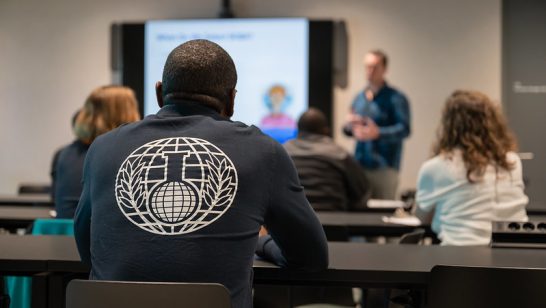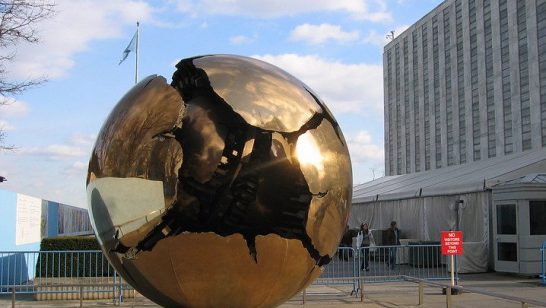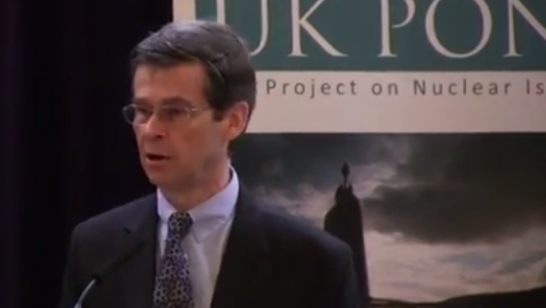
2020 is likely to prove a pivotal year for the future of arms control. The Nuclear Non-Proliferation Treaty (NPT) Review Conference is approaching and the prospects of New START and the Treaty on Open Skies are hanging in the balance. However, such trust as remains between major players may be further eroded by the outcome of investigations into chemical weapons use in Syria. In early 2020, a long-awaited report by the new attribution team of the Organisation for the Prohibition of Chemical Weapons (OPCW) is expected to be published. If the report concludes that the Syrian government is responsible for chemical weapons use, then it will drive another wedge between the P3 and the Assad regime’s main diplomatic allies: Russia, China and Iran.
The interrelationship between chemical weapons disarmament and nuclear arms control is nothing new and is particularly relevant to the Middle East. Egypt has not signed the Chemical Weapons Convention (CWC) due to Israel’s non-membership of the NPT. In turn, Israel is the only country to have signed but not ratified the CWC, on the grounds that it will do so when Egypt does. These stances have stalled negotiations over a Middle East zone free of Weapons of Mass destruction (WMD), which in turn have complicated previous NPT Preparatory Commissions (Prepcoms). The November 2019 conference on a WMD-free zone in the Middle East saw mutual recrimination over Syrian use of chemical weapons. While the conference was able to generate a limited political consensus, its inability collectively to acknowledge chemical weapons usage (even unattributed) was not promising.
The salience of chemical weapons in the future of arms control sharply increased in 2018. The Salisbury poisoning and the chemical attack at Douma created a hostile environment heading into the Second NPT Prepcom Session. The United States, United Kingdom, Russia and Syria traded allegations about their non-compliance with the CWC. The fallout from the Salisbury poisonings contributed to a yearlong pause in the P5 Process. Amid this acrimony, the United States proposed a new initiative in 2018, aimed at ‘Creating the Conditions for Nuclear Disarmament.’ Even at its launch it was highlighted that the ‘strengthening of trust’ was key, but currently undermined by states’ noncompliance with existing treaties, notably the CWC. Breaches of the CWC were again highlighted by the US representative at the Conference on Disarmament in 2019, where Russia was denounced as a ‘malign actor’, in part for assisting the Assad regime’s ‘cover-up of chemical weapons use.’
Following Salisbury and Douma, the United Kingdom spearheaded an initiative to provide the OPCW with an attribution mechanism for chemical attacks in Syria. This task had previously been handled by the UN-OPCW Joint Investigative Mechanism (JIM), which assigned responsibility for multiple chemical attacks to the Syrian government and Islamic State. However, the mechanism was subject to annual renewal at the UN Security Council and Russia used its veto four times to block the renewal of JIM in late 2017.
Although the JIM has already found that the Assad regime used chemical weapons, a finding by the new OPCW Investigation and Identification Team (IIT) could be functionally different. Whereas the JIM was outside the OPCW and reported to the UN Security Council (UNSC), the IIT is staffed by the OPCW technical secretariat and will present its findings to the OPCW Executive Council. If the IIT found the Syrian government responsible for chemical attacks, then Syria would have been found by the Technical Secretariat to be in non-compliance with the CWC under Article I. If Article I is breached, ‘the Conference [of States Parties] may recommend collective measures to States Parties in conformity with international law.’ This potential mechanism for imposing sanctions that avoids the veto in the UNSC has clearly alarmed Russian officials, who accuse the United States of undermining the CWC by ‘unlawfully’ granting the Technical Secretariat punitive powers. Russia presented a draft resolution in May 2019 that asserted that the Security Council was the ‘only international body that can impose measures on countries that violate the Chemical Weapons Convention.’ The tension over this issue has led Russian representatives to denounce the OPCW as having become ‘politicised.’
Could tension within the OPCW have been avoided? Since Obama’s ‘red line’ comments in 2012, chemical weapons use in Syria has been a totemic issue amongst the international community. After the Ghouta incident in 2013, Syria was coerced into the CWC and UNSCR 2118 resolved ‘to impose measures under Chapter VII of the United Nations Charter’ in the event of further chemical weapons use. Given the explicit link between chemical weapons use and possible intervention, it is unsurprising that the long-held tradition of working with consensus within the OPCW fragmented. The first ‘unprecedented’ breach of consensus occurred in 2015 when the OPCW’s Fact Finding Mission returned reports that suggested that chlorine was being used as a chemical weapon in Syria. Direct Western intervention in the Syrian conflict against the Assad regime followed the 2017 Khan Shaykhun and 2018 Douma chemical incidents. The direct geopolitical implications of alleged chemical weapons use, states’ differing interests in the region, and violations of the core purpose of the CWC meant that the politicisation of the OPCW was inevitable.
The real question for the international community is whether the OPCW and, by extension, the CWC can survive disagreement over the IIT’s findings and new ability to attribute attacks. Resumption of consensus seems impossible in the short term: Russia held an Arria-Formula meeting of the Security Council on January 20th 2020 where according to the US delegation, a ‘blatant attempt [was made]… to weaken the credibility of the OPCW.’ Mutual suspicion has been stoked by alleged Russian attempts to hack the OPCW and the disclosure of internal OPCW documents. Russia is not alone in its concerns; the Non-Aligned Movement plus China have also condemned ‘unsubstantiated allegations’ of the use of chemical weapons by the OPCW based on ‘open sources.’ In response, the OPCW Technical Secretariat has been placed in a position where it has needed to defend its findings. Briefings, Statements and documents have been issued by the Technical Secretariat and the Director General in direct contradiction to Syrian and Russian allegations. Polarisation following the IIT’s foundation now means that the OPCW’s budget is routinely passed via majority vote, with Russia, China, Syria and Iran (and 15 other states) voting against the 2020 budget.
Therefore, the IIT’s first report and how states react will bring the OPCW and CWC to a crossroads. A clear division exists between states that support the new attribution mechanism, viewing it as vital to upholding the Convention’s purpose and states that perceive the IIT as an illegitimate expression of Western interests. The contentious issue of chemical weapons use in Syria continues to undermine trust between the United States and Russia. Any attempt to impose consequences upon a State Party within the CWC found responsible for chemical weapons use will prove hugely controversial, given the disputed legitimacy of the mandate, funding and technical findings surrounding attribution.
State withdrawal or boycotting of proceedings cannot be ruled out. This would be a heavy blow for the CWC, the world’s most widely subscribed arms control treaty, and a terrible preamble to the NPT Review Conference, the end-game on New START extension and the possible opening of Russia-US nuclear arms control negotiations. There are no easy solutions. But to minimise future damage, all states committed to a world free of chemical weapons must provide the Technical Secretariat with the broadest possible base of technical, diplomatic and financial support in order to sustain faith in its findings.
The opinions articulated above represent the views of the author, and do not necessarily reflect the position of the European Leadership Network (ELN) or any of the ELN’s members. The ELN’s aim is to encourage debates that will help develop Europe’s capacity to address pressing foreign, defence, and security challenges.
Image: Flickr, OPCW



